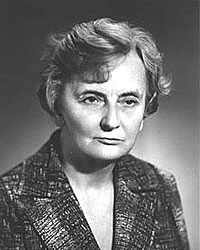| Naissance |
Kaunas |
|---|---|
| Décès |
(à 78 ans) Vilnius |
| Nationalité |
|
| Formation | Université de Vilnius |
|---|---|
| Titres | Docteur en sciences économiques |
| Profession | Psychologue, économiste et sociologue |
| Employeur | Université lituanienne de sciences pédagogiques (en) |
| Travaux | socionique |
| Approche | Psycho sociologique |
Aushra Augustinavichute (en lituanien Aušra Augustinavičiūtė), née le et morte le , sociologue et psychologue lituanienne, est l'inventeur de la socionique, théorie des types de personnalité inspirée des idées de Carl Gustav Jung[1], et associant sociologie et psychologie.
- Blutner R., Hochnadel E., « Two qubits for CG Jung's theory of personality », Cognitive Systems Research, vol. 11, no 3, , p. 243-259 (lire en ligne)
« Socionics was developed in the 1970s and 1980s mainly by the Lithuanian researcher Ausra Augustinaviciute. The name 'socionics' is derived from the word 'society, since Augustinaviciute believed that each personality type has a distinct purpose in society, which can be described and explained by socionics. The system of socionics is in several respects similar to the MBTI; however, whereas the latter is dominantly used in the USA and Western Europe, the former is mainly used in Russia and Eastern Europe. For more information, the reader is referred to the website of the International Institute of Socionics and to several scientific journals edited by this institution (see http://socionic.info/en/esocjur.html#top). Despite of several similarities there are also important differences. For instance, the MBTI is based on questionnaires with so-called forced-choice questions. Forcedchoice means that the individual has to choose only one of two possible answers to each question. Obviously, such tests are self-referential. That means they are based on judgments of persons about themselves. Socionics rejects the use of such questionnaires and is based on interviews and direct observation of certain aspects of human behavior instead. However, if personality tests are well constructed and their questions are answered properly, we expect results that often make sense. For that reason, we do not reject test questions principally, but we have to take into account their self-referential character. Another difference relates to the fact that socionics tries to understand Jung's intuitive system and to provide a deeper explanation for it, mainly in terms of informational metabolism (Kepinski & PZWL, 1972). Further, socionics is not so much a theory of personalities per se, but much more a theory of type relations providing an analysis of the relationships that arise as a consequence of the interaction of people with different personalities. »
